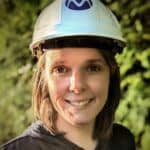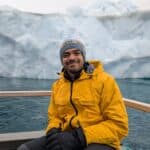Profile
Robin Smith
-
About Me:
I’m a climate scientist who loves baking, music and being outdoors. My children say I don’t know enough about DC superheroes or Minecraft.
-
Read more
I live near Reading with my wife, two daughters, two rabbits, 3 chickens and too many eggs. And sometimes a foster cat. The humans in the house all like baking things, especially cake, but even so, still too many eggs. Aside from my family, I like cake, trombones, live music, speaking other languages badly, running very long distances (=more cake) and books.
-
My pronouns are:
he/him.
-
My Work:
I program and run REALLY complicated computer models of the Earth’s climate system so we can make predictions of how our climate will change in the future. Right now I’m worrying most about my ice sheets
-
Read more
One of the ways scientists understand how the Earth’s climate works and make predictions about how it will change in the future is with computer models that can simulate the physics going on the atmosphere, oceans, ice sheets and so on. Some of these models are so complex and have so many different parts to them that we can only run them on the biggest computers in the world. For the last twenty years I’ve been hacking these models to let them work in new and interesting ways – my PhD was spent studying the climate of an Earth submerged under water but I’ve also spun the Earth backwards, turned off the sun… you get the idea.
Right now I work as part of the team looking after the new UK Earth System model, a national project to build probably the most complex climate model in the world. The computers we need to use to run these models take up entire buildings all on their own. My job has been to find ways to make the ice sheets in the climate model melt and flow, which is really important if we want to find out about future sea-level rise, but also means we can try playing with things like glacial cycles and bury the country in ice 🙂
-
My Typical Day:
My typical day might look pretty boring – I cycle or run to the University, and sit in front of a computer until it’s time to go home again! However, the computer on my desk is connected to some of the biggest computers on the planet, and inside those computers we can play with copies of the whole world.
-
Read more
My typical day might look pretty boring – I cycle or run to the University, and sit in front of a computer until it’s time to go home again! However, the computer on my desk is connected to some of the biggest computers on the planet, and inside those computers we can play with copies of the whole world.
I might fast-forward time to 2500 and see how much Greenland might melt, or go back 25 thousand years and see how many kilometres of ice I can make grow over the United States. Global climate modelling involves teams of people from all over the world, so I might have a meeting with colleagues in Europe, video-conference with someone in the USA, or swap emails with someone in Japan.
-
Education:
I started at a small village school in Blean in Kent, and moved onto Kent College in nearby Canterbury, where I did Physics, Maths and German for A levels. I was very lucky to be offered a place at Oxford University where I studied Physics for 4 years. In my final year I found myself a bit disillusioned with whether the tiny details of lasers or the maths of the quantum theory were relevant for real world we live in, but found that my background was seen as very helpful for researchers building models of how the climate system works – that seemed like a much more relatable area of science to be in.
I accepted a position on a PhD course at the National Oceanography Centre with the University of Southampton to spend 3 years playing with computers to do experiments on the global ocean circulation in a virtual world and I’ve been doing similar things, in different places and on different computers, ever since.
-
Qualifications:
GCSEs in Maths, Sciences, French, German, Latin (and others)
A levels in Maths, Physics, German, Electronics.
– Maths and Physics are really really useful for going into Earth sciences, more so than Geography for a lot of jobs.
– There’s a lot of international collaboration, so although you /can/ work in English all the time, awareness of other languages can help tooUndergraduate and Masters degrees in pure physics.
– the more physics the better!PhD in Oceanography
– all of the parts of the Earth system are connected, so it’s often not so difficult to change between atmosphere, ocean and land physics, no matter where you started -
Work History:
– holiday work on farms, in shops, cleaning…
– part-time librarian
– science fellow at Max Planck Institute for Meteorology, Hamburg
– science researcher at the University of Reading -
Current Job:
I’m nominally an Associate Professor, but I don’t do any lecturing or teaching at the University – I’m very lucky to be paid just to do research. I have a team of 5 people here and work with colleagues around the country to work on the UK Earth System Model – that means developing the code, running simulations on national supercomputers, using those simulations to help us understand what is happening – and predict what will happen – in the real world, and communicating what we’ve found to whoever is interested.
-
Employer:
National Centre for Atmospheric Science, University of Reading,
-
My Interview
-
How would you describe yourself in 3 words?
Hacks the (digital) climate
What did you want to be after you left school?
An astrophysicist - in the end I thoght space was too empty and the Earth was too interesting
Were you ever in trouble at school?
Not that I can remember!
If you weren't doing this job, what would you choose instead?
Baker
Who is your favourite singer or band?
Elbow
What's your favourite food?
Fresh bread
If you had 3 wishes for yourself what would they be? - be honest!
A house by the sea, to be able to fly, more cake
Tell us a joke.
What's a pirate's favourite letter of the alphabet? They like R, but their first love is the C
-




